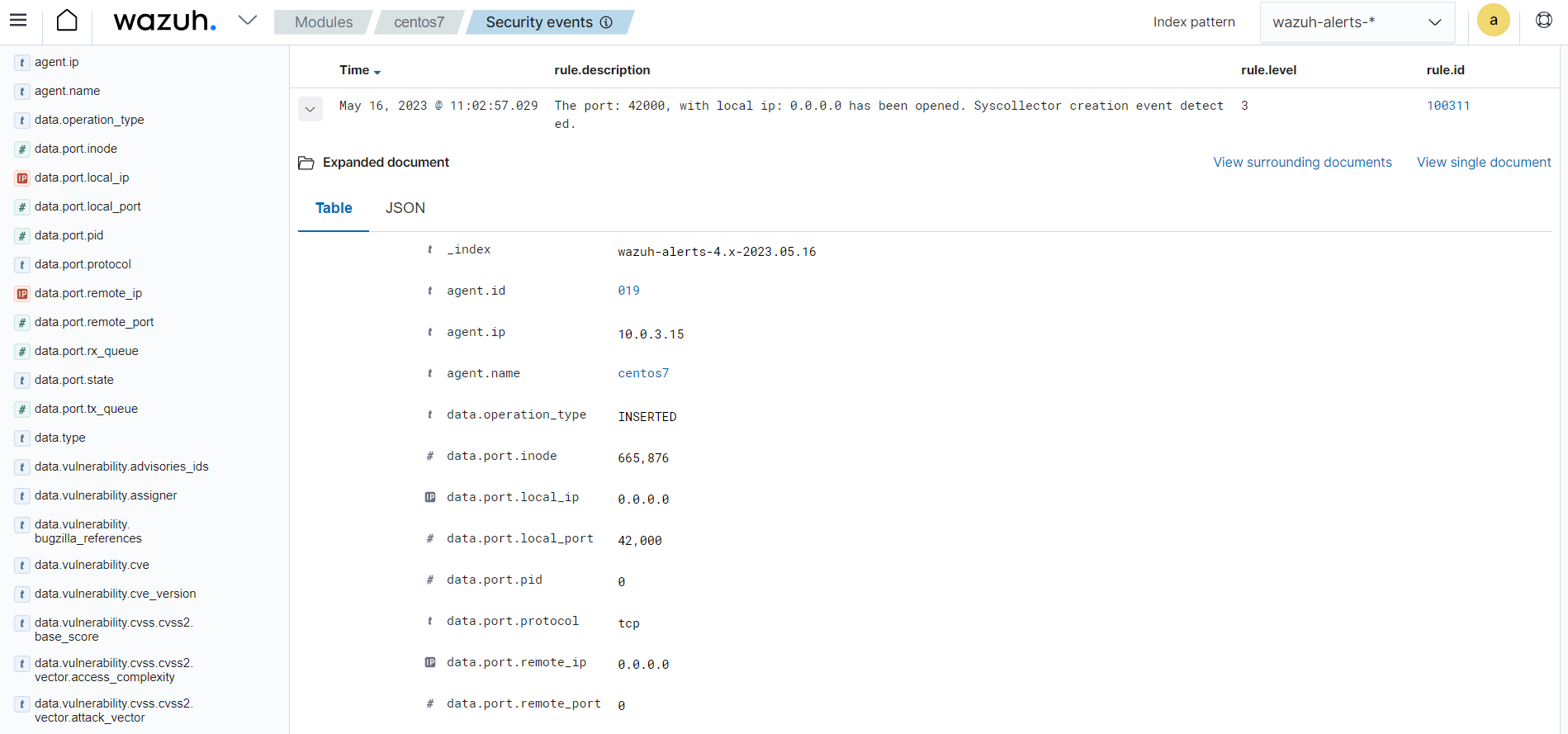Using Syscollector information to trigger alerts
You can create rules to trigger alerts based on the information collected by the Syscollector module and display this information in the alert's description. Syscollector uses the rule ID 221, and the rule level is 0, so by default, it is not shown on the Wazuh dashboard. To see Syscollector searchable fields on the Wazuh dashboard, you need a custom rule that inherits the Syscollector rule ID.
Create a custom rule that uses the built-in Syscollector rule 221
You must create custom rules that inherit the parent rule ID 221 with a severity level of 3 or higher. For example, the custom rule in the /var/ossec/etc/rules/local_rules.xml file below is triggered when a port is opened, modified, or closed on a monitored endpoint:
<group name="syscollector,">
<!-- ports -->
<rule id="100310" level="3" >
<if_sid>221</if_sid>
<field name="type">dbsync_ports</field>
<description>Syscollector ports event.</description>
</rule>
<rule id="100311" level="3" >
<if_sid>100310</if_sid>
<field name="operation_type">INSERTED</field>
<description>The port: $(port.local_port), with local ip: $(port.local_ip) has been opened. Syscollector creation event detected.</description>
</rule>
<rule id="100312" level="3" >
<if_sid>100310</if_sid>
<field name="operation_type">MODIFIED</field>
<description>The port: $(port.local_port), with local ip: $(port.local_ip) has been modified. Syscollector modification event detected.</description>
</rule>
<rule id="100313" level="3" >
<if_sid>100310</if_sid>
<field name="operation_type">DELETED</field>
<description>The port: $(port.local_port), with local ip: $(port.local_ip) has been closed. Syscollector deletion event detected.</description>
</rule>
</group>
After adding the configuration, restart the Wazuh manager.
# systemctl restart wazuh-manager
The alerts for a port opening operation are displayed in the Wazuh dashboard as follows:

Note
The initial scan does not generate alerts. Alerts are triggered after a difference in results between the first and second Syscollector scans is detected. This second scan will occur when the configured interval is reached.
New searchable fields on the Wazuh dashboard
You can create Syscollector custom rules using any of the discussed methods, then search for Syscollector alerts on the Wazuh dashboard. The Wazuh indexer saves the Syscollector fields as data.type.value. For example, for hardware type, the cpu_name field is data.hardware.cpu_name. The table lists all searchable fields for the different Syscollector properties.
Type |
Fields |
Example |
|---|---|---|
Hardware |
cpu_name, cpu_cores, cpu_mhz, ram_total, ram_free, ram_usage |
data.hardware.cpu_mhz |
Operating System |
architecture, name, version, codename, major, minor, build, platform, sysname, release, release_version |
data.os.codename |
Port |
local_ip, local_port, remote_ip, remote_port, tx_queue, rx_queue, inode, state, pid, process |
data.port.inode |
Program |
name, priority, section, size, vendor, install_time, version, architecture, multiarch, source, description, location |
data.program.name |
Process |
name, state, ppid, utime, stime, cmd, args, euser, ruser, suser, egroup, sgroup, fgroup, rgroup, priority, nice, size, vm_size, resident, share, start_time, pgrp, session, nlwp, tgid, tty, processor |
data.process.state |
Network |
mac, adapter, type, state, mtu, tx_bytes, rx_bytes, tx_errors, rx_errors, tx_dropped, rx_dropped, tx_packets, rx_packets, ipv4, ipv6 |
data.netinfo.iface.ipv4.address, data.netinfo.iface.mac |
Hotfix |
hotfix |
data.hotfix |
Users |
host_ip, login_status, login_tty, login_type, process_pid, user_auth_failures.count, user_auth_failed_timestamp, user_created, user_full_name, user_group_id, user_group_id_signed, user_groups, user_home, user_id, user_is_hidden, user_is_remote, user_last_login, user_name, user_password_expiration_date, user_password_hash_algorithm, user_password_inactive_days, user_password_last_change, user_password_max_days_between_changes, user_password_min_days_between_changes, user_password_status, user_password_warning_days_before_expiration, user_roles, user_shell, user_type, user_uid_signed, user_uuid |
data.host_ip |
Groups |
group_id, group_id_signed, group_is_hidden, group_name, group_users, group_uuid |
data.group_id |
Services |
error_log_file_path, file_path, log_file_path, process_args, process_executable, process_group_name, process_pid, process_root_directory, process_user_name, process_working_directory, service_address, service_description, service_enabled, service_exit_code, services.win32_exit_code, service_frequency, service_id, service_inetd_compatibility, service_name, service_object_path, service_restart, service_start_type, service_starts_on_mount, service_starts_on_not_empty_directory, service_starts_on_path_modified, service_state, service_sub_state, service_target_address, service_target_ephemeral_id, service_target_type, service_type, service_win32_exit_code |
data.error_log_file_path |
Browser extensions |
browser_name, browser_profile_name, browser_profile_path, browser_profile_referenced, file_hash_sha256, package_autoupdate, package_build_version, package_description, package_enabled, package_from_webstore, package_id, package_installed, package_name, package_path, package_permissions, package_persistent, package_reference, package_type, package_vendor, package_version, package_visible, user_id |
data.browser_name |